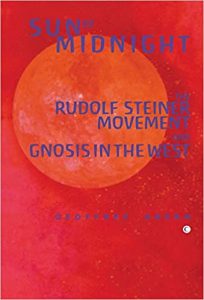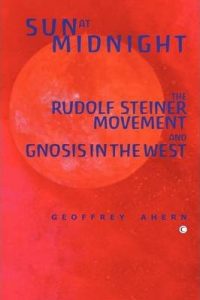Purchase Information
Purchase from Amazon or direct from the publisher
See below for further purchase options or read on to discover the value of the book
Reasons to read this book
- Overview --not abridged or "potted Anthroposophy
- Contrasts with Steiner's teaching through direct experience
- Diversity of perspectives promotes understanding without prejudice or bias
- Unique descriptive approach, neutral stance
- Enables reader understanding of relevant material, and drawing independent materials
The value of this book
Far from creating a “potted anthroposophy”, in this single volume Geoffrey Ahern has provided what all of Steiner’s own writings do not — an overview of Steiner’s belief system, intended not for the student who wishes to become an Anthroposophist, or “take personal responsibility for Anthroposophy”, but for the rest of us, who have more need of a map than we do of direct experience of the terrain.
Steiner himself made it clear that his teachings were intended to let the student of Anthroposophy learn by experiencing Anthroposophical reality directly, through direct practice of its many practical applications in daily life. The difference in intent has created two very different approaches, and given this book a unique place on the bookshelves of Anthroposophists and non-Anthroposophists alike.
It is rare for an outsider to be able to make a clear and non-judgemental examination of both the scope and the details of a complex and comprehensive belief system without introducing some bias of their own. That Geoffrey Ahern has managed to create to do so, providing the facts in the context of scholarly interpretation while highlighting equally those aspects which contain inherent value judgements, attributing each to its source, is one of the greatest triumphs of this book.
What You Get
Ahern has put this overview into context in a way that appears to be taboo within the Anthroposophic tradition of writing on Steiner and his teachings, by providing a comprehensive description of Steiner’s life examined not only through the lens of modern sociological methodologies, but also through the perspective of Steiner’s own teachings. This approach is then turned on the context in which Steiner rose to prominence as a spiritual leader, as the unfolding development of the Western Esoteric Tradition itself is described and examined from a sociological perspective, before Ahern’s unusual reversal of roles, in which he examines the core assumptions of sociology from the perspective of the ongoing drive to human spirituality.
Ahern displays an unusual capacity to present clear, factual material about people both as individuals and as social movements, without losing a compassionate awareness of their basic humanity, and the quality of life which results from their choices of belief and action. His focus on allowing the facts of Steiner’s life and teachings to speak for themselves, and the effort he makes to use the tools of sociological sciences to increase understanding of those facts without introducing prejudicial judgement of one value system by the standards of another, enables each reader to take in the wealth of information provided, and reach their own conclusions.
It is this uniquely descriptive approach, Ahern’s neutral stance and his choice to balance a sociological view of a spiritual movement with an acknowledgement of sociology’s own logical flaws and assumptions in its treatment of spirituality, to give preference to clear and comprehensive description over critical deconstruction, which has made this book the definitive classic study of Steiner and the movements he founded, as well as those from which he came.





